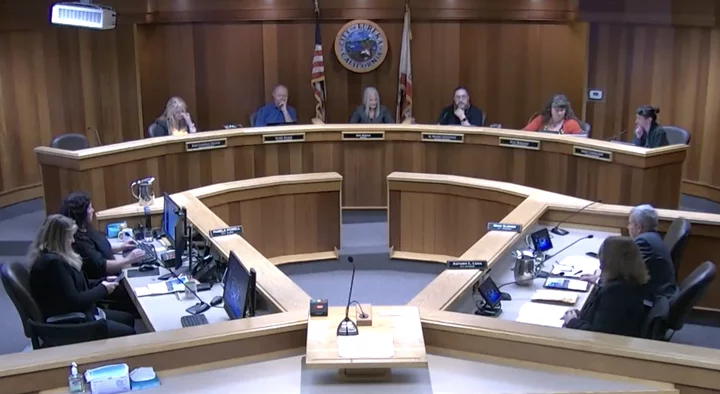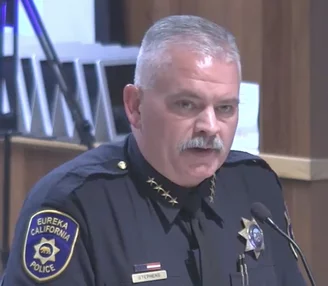Screenshot of Tuesday’s Eureka Council meeting.
###
How far should the Eureka Police Department take crime surveillance in the city?
At Tuesday’s meeting, the Eureka City Council weighed the pros and cons of a proposal from the Eureka Police Department to install 21 automated license plate-reading (ALPR) cameras along the city’s main thoroughfares. After an extensive conversation, the council ultimately voted to table its decision due to privacy concerns.
The technology, which would be provided by Flock Safety, collects license plate details for every car that passes and stores that information in a database that allows law enforcement agencies to compare license plate numbers against stolen vehicles or individuals wanted on criminal charges. ALPR does not use facial recognition technology and the data is deleted after 30 days.
EPD Police Chief Brian Stephens presented the draft ALPR policy – linked here – to the council on Tuesday and explained how community policing has changed since the turn of the century. “It’s not as easy to police as it was,” he said. “We can’t just put officers on the street … and expect that we’re going to get the results that we want or the results that we may have seen 20 years ago.”
That said, Stephens emphasized that EPD will “always need officers on the street,” but said Flock’s ALPR technology “truly has the capability to be a force multiplier” for the department.
“We will be able to locate vehicles associated with crimes committed in our region quicker,” he continued. “We can use this technology as an investigative tool to further investigations after a crime has been committed within our city, give our investigators quicker leads and reduce the time a suspect is potentially on the loose to victimize others in our community.”
EPD’s draft policy was modeled after the Vallejo Police Department’s ALPR policy and best practices issued by Lexipol, a Texas-based company that provides policy guidelines and training standards for law enforcement agencies across the country, Stephens said. The data collected through the ALPR program would be stored in a “secured cloud base” that would only be accessible by certain EPD staff.
“Remember, all the system is collecting is vehicle description and license plate, nothing else,” Stephens said. “[The data] is not owned by Flock, and Flock can’t access the data for their purposes. Only EPD can determine who has access to the data. Therefore, Flock Safety cannot sell or share this data with third parties, and this will be a part of our contract.”
Speaking via Zoom, Flock’s Community Affairs Manager Jonathan Paz said the company uses “end-to-end encryption,” a security method that prevents third parties from accessing data while it is being transferred from one system or device to another. “Let’s say the DMV is hacked – they’re not going to have access to our system,” Paz said. “We are end-to-end encrypted and manage our own system.”
Paz also shared a few success stories from the 400-plus law enforcement agencies that contract with Flock Safety. He recalled one instance in which ALPR technology helped local police officers track down three individuals who had brutally assaulted a man in the Bay Area. Investigators got hold of a possible license plate for the suspect vehicle, ran it through the Flock system and, about a month-and-a-half after the assault, were able to track down and arrest the suspects.
Paz also claimed that San Merino, a city in Los Angeles County, has seen a “70 percent decrease in residential burglaries” after increasing the number of ALPR cameras in the city.
“I can go on and on,” he said.
However, Flock’s success stories weren’t compelling enough to convince the city council, all of whom shared concerns about privacy and data sharing.
Councilmember Scott Bauer asked Paz to expand on the data protection measures Flock Safety employs and whether the company uses facial recognition technology.
“None of your personal data is actually being stored,” Paz said. “The only data that would actually be kept would be your vehicle fingerprint. … If there was a capture of a red Honda, the most data that would be shared that would be affiliated with you would be potentially your license plate, which is owned by the state, technically. So, not saying that there isn’t a concern there, but there is no personal information being stored within our systems.”
Councilmember Kati Moulton asked Paz several questions about data protection and the physical location of the company’s servers. Paz said the company’s IT department is based in Georgia but noted that they also partner with Amazon for data storage.
“So, if law enforcement in another state – or in our state or anywhere at all – got a warrant to ask Amazon for information from Eureka, circumventing the EPD… and your company itself and going directly after the storage that is now in a fourth party’s hands. … What’s to stop that from happening?” Moulton asked.
Paz seemed hesitant to speak to the hypothetical situation but said Flock Safety would honor its contract with the City of Eureka “regardless of whatever pending litigation is happening.”
“That data we consider to be yours, and we’re helping monitor and help preserve it,” he added. “But we have a contractual obligation to hard delete after 30 days.”
Councilmember Leslie Castellano asked about immigration law and whether the ALPR system would allow an out-of-state department to track an individual “for immigration reasons.”
The city’s draft policy “does not permit the sharing of ALPR data gathered by the city or its contractors/subcontractors for purpose of federal immigration enforcement,” in accordance with state law. Even if state law were to change, Stephens said the city’s policy would not be affected.
“I think the policy is clear that it won’t be used … to track anyone or to share information for immigration purposes,” he said. “If I’m the chief at that time, if something gets rolled back, it’s not going to change the reasons why we want and need the system. I still wouldn’t report that information for that purpose.”
Castellano also asked about the projected cost of the ALPR program and whether it would increase over time. Eureka City Manager Miles Slattery said the city is looking at a two-year agreement with Flock that would cost about $74,000 for installation and monitoring services in the first year and $60,000 in subsequent years.
“If it gets to the point where it can’t fit within our budget, or if it gets to the point at which it’s not within staff’s purview under the procurement policy – which is $100,000 – that purchase would have to come back to council,” Slattery added.
Castellano noted that the Humboldt County Sheriff’s Office recently implemented its own ALPR program and asked if Eureka’s cameras would be redundant. Stephens said HCSO does not currently have cameras “near the ingress and egress points of the city.”
At one point in the discussion, Moulton suggested that the city’s Community Oversight on Police Practices (COPP) board and the City Attorney’s Office review the draft policy before the council makes a final decision on the matter. Her suggestion was echoed by the rest of the council.
City Attorney Autumn Luna said she felt it would be most appropriate for her office to address the legal issues brought up during the council’s discussion before sending the proposed policy over to the COPP board for review. Luna added that it would probably take a few months to “really flesh out” all of the issues raised at the meeting.
After a bit of additional discussion, the council voted 5-0 to table the discussion until the City Attorney’s Office and the city’s COPP board had a chance to review the ALPR policy.


CLICK TO MANAGE